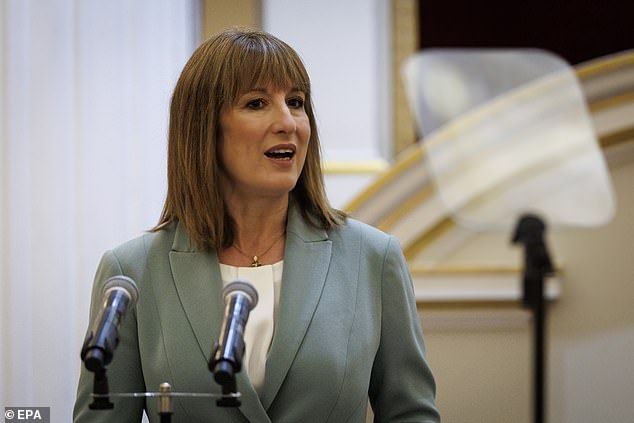[ad_1]
Britain is at risk of a bout of stagflation as Labour’s tax hikes have pushed up inflation and killed off growth.
Bleak official figures today showed consumer price inflation climbed to a higher-than-expected 3.6 per cent in June.
It comes as the economy also suffers from disappointing growth, with data last week showing that output shrank in May for the second month in a row.
The figures fuelled fears that the UK is facing a period of stagflation – the dismal scenario in which growth stagnates as prices still climb.
Experts warned inflation will remain above 3 per cent for the rest of this year, meaning fewer interest rate cuts. The National Institute of Economic and Social Research said it does not expect inflation to return to the 2 per cent target until late next year.
Monica George Michail, an economist at the institute, said: ‘We forecast inflation to remain elevated and only fall back to the 2 per cent target on a lasting basis by late 2026.
‘We therefore expect the Bank of England to cut interest rates just one further time this year.’
In June, inflation hit its highest level since January 2024, despite expectations that it would remain flat at 3.4 per cent.

The figures came as an embarrassing blow for Chancellor Rachel Reeves less than 24 hours after her Mansion House speech

Monica George Michail said: ‘We expect the Bank of England to cut interest rates just one further time this year’
The pace of price rises has more than doubled since last September, when it was just 1.7 per cent.
And food inflation has climbed higher for the third month in a row to hit a 16-month high of 4.5 per cent.
Staples such as bread, rice and pasta were among the foods that saw a sharp price increase during the month. Meanwhile, a steep 7.9 per cent increase in air fares between May and June – a time of year when they usually go up – was the largest June rise for seven years.
The figures came as an embarrassing blow for Chancellor Rachel Reeves less than 24 hours after her Mansion House speech in the City in which she announced a series of reforms designed to boost growth and claimed to be creating ‘a Britain that is better off’.
But experts said her £25billion employer National Insurance raid is helping push up inflation as higher costs are passed on to consumers. Some warned that the menace of ‘stagflation’ was approaching.
Higher inflation will make it harder for the Bank of England to cut interest rates. However, the Bank’s worries about unemployment mean it is still likely to cut borrowing costs next month.
Meanwhile, job figures due out today threaten to add to the gloom facing the Chancellor.
Anna Leach, chief economist at the Institute of Directors, said: ‘With inflation still proving sticky and economic growth stagnating, the UK is skirting the edges of stagflation.’

Tory business spokesman Andrew Griffith (pictured) said the figures ‘show the folly of the Chancellor’s choice to hike National Insurance on businesses’ (file image)
Tory business spokesman Andrew Griffith said the figures ‘show the folly of the Chancellor’s choice to hike National Insurance on businesses rather than the more honest approach of income tax’.
He added: ‘Higher costs and rising unemployment are the price.’
Andrew Wishart, an analyst at Berenberg, also blamed the Chancellor for the state of the economy. ‘Companies passing on Government-imposed increases in their costs caused inflation to come in higher than expected in June,’ he said.
Ms Reeves said: ‘I know working people are still struggling with the cost of living.
‘There is more to do and I’m determined we deliver on our Plan for Change to put more money into people’s pockets.’
[ad_2]
This article was originally published by a www.dailymail.co.uk . Read the Original article here. .

